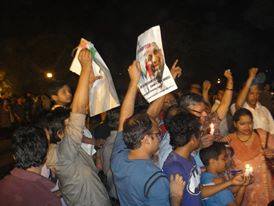
The background of the Indian Constitution is formed by its anti-colonial struggle, within which the seeds of a political public sphere and democratic constitution were sown.
The Indian people fought hard and long to publicly express their views on colonial policies and laws and form a public opinion against them.
People act as watchdogs and constantly monitor governments’ acts, which provides feedback to the governments about their policies and actions after which the concerned government, through consultation, meetings and discussion, recognizes and rectifies its mistakes.
In Ramlila Maidan Incident v. Home Secretary, Union Of India & Ors. case (2012), the Supreme Court had stated, “Citizens have a fundamental right to assembly and peaceful protest which cannot be taken away by an arbitrary executive or legislative action.”
The term ‘dissent’ means when a person or a group of persons hold an opinion that substantially differs from the one commonly held. In simple words, it is a difference of opinion.
‘Let’s agree to disagree’ may sum up the gist of the word ‘dissent’ in simple terms. Dissent generally, implies disagreement, criticism, questioning, or protest against the coercive decision or unjust laws and policies imposed by a person/s in authority. Explored constructively, peaceful and nonviolent dissent may lead to dialogue, open discussions, entrenchment of democratic ideas, undoing injustices, and ending oppression. Collective disobedience often results in a constructive social transformation.
The history of dissent in the Indian subcontinent dates back to the Vedic period. The saints of the Vedic era advocated that one should try to be open to all opinions, however different. Later on, the historians observed that the religious saints such as Guru Nanak subjected the then prevalent social norms to open condemnation. Afterward, it became more evident during the freedom movement initiated by Mahatma Gandhi. In fact, dissent and protest were the two notable principles that marked India’s struggle for independence. Those engaged in the fight went against the ruling ideology of the colonial government, because of which we can live the life we are ultimately living today. Within three years after the departure of the British from the country, the Constitution came into force. The makers of this supreme law included the principles of protest and dissent within it. The operation of these two hallmark features of democracy is also liable to reasonable restrictions.
Freedom of speech and expression, as guaranteed under Article 19(1)(a) of the Indian Constitution, has been recognised as a cornerstone right, which is essential to the realisation of individual liberty and the advancement of democracy.
Democratic governance is in decline globally, challenged by authoritarian and anti-democratic forces. For citizens who dissent – speak up for human rights or argue against corruption – the costs can be steep: condemnation, harsh penalties, involuntary exile, and threats on their lives.
Justice Deepak Gupta rightly stated that , “Every society has its own rules and over a period of time when people only stick to the age-old rules and conventions, society degenerates. New thinkers are born when they disagree with well accepted norms of society. If everybody follows the well-trodden path, no new paths will be created, no new explorations will be done and no new vistas will be found.
If a person does not ask questions and does not raise doubts questioning age-old systems, no new systems would develop and the horizons of the mind will not expand. Whether it be Buddha, Mahavira, Jesus Christ, Prophet Mohammad, Guru Nanak Dev, Martin Luther, Kabir, Raja Ram Mohan Roy, Swami Dayanand Saraswati, Karl Marx or Mahatma Gandhi, new thoughts and practices would not have been established, if they had quietly submitted to the views of their forefathers and had not questioned the existing practices, beliefs and rituals.”
Rule of majority is an integral part of democracy but majoritarianism is the antithesis of democracy.
In Romila Thapar Case (2018), Justice D.Y. Chandrachud observed in his dissenting opinion “that Individuals who dissent from the government are entitled to the freedoms which are guaranteed by the Constitution. Dissent is a symbol of a vibrant democracy. Voices in opposition cannot be muzzled by persecuting those who take up unpopular causes.”
One’s ability to express assentas well as dissentare two fundamental acts of democratic citizenship. Gestures of assent are often procedural and orderly (i.e., participating in the pledge of allegiance or the national anthem). But gestures of dissent often violate procedural norms in order to effect strategic disorder (as in cases of public sit-ins and marches or refusals to participate in pledges and oaths). Indeed, acts of dissent often imply a fundamental rejection of behavioural expectations regarding speech and civility.
History depicts that authoritarian rulers have used tools such as the law and violence to suppress dissent, and this repression of diverse voices by authoritarian states continues during modern times.
“I disapprove of what you say, but I will defend to the death your right to say it”, stated Voltaire, a French philosopher centuries ago. But those in power, those who rule, those who enjoy privileges, or are in a position of authority, frequently disagree with such a proposition. This happens in unequal, hierarchical families, societies, communities, and in all such political contexts where those govern make all attempts to silence and crush the dissenting voices.
In all such situations of oppression and domination, questioning authority is perceived as defiance and, therefore, undesirable and a threat to the law-and-order situation. World over, disobedience to authority is considered a breach of moral as well as statutory enactments by authoritarian states. Those in power command total obedience, submission, and allegiance. The repressive states are crushing any defiance, question or criticism. The state fails to recognize the moral claim of a citizen to disobey the law.
The right to dissent is very much a fundamental right. Yet the state can impose reasonable restrictions on this right on the ground of Sovereignty of state, security of state etc as mention under Article 19(2) of the constitution.
Siddharth Mishra
(The author is a Lawyer at Supreme Court of India)